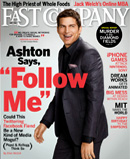Mr. Social: Ashton Kutcher Plans to Be the Next New-Media Mogul
By: Ellen McGirt
DUDE, WHERES THE CASH? Here's what scares Kutcher: "When I have a conversation with someone and they say, 'I'm not worried about monetization yet.' " | Photographs by Jill Greenberg

ON THE JOB Everyone at Katalyst has a role in the Katalyst HQ mockumentary Web series, including cofounder Jason Goldberg, left, and new-media director Sarah Ross, above right. This year's sponsor is Nestlé's Hot Pockets, below right.
Related Content
I've walked into the middle of a swine flu outbreak.
"Here, put this on!" Ashton Kutcher bounds from around the corner in his loft-style Hollywood office, wearing a paper face mask and holding another one. "You can choose whether to wear it or not, but we all are. We can't afford to get sick!" Within seconds, I am surrounded by a fast-moving herd of masked Flip-cam marauders, filming my every move. Perched on the stairs. Popping out from the office kitchen. Uh-oh. "Seriously!" says Kutcher, with a goofy grin around his mask. "Swine flu!" He points to the mask in my hand. Punked and defeated, I put it on. "Awesome," he laughs.
I've walked right into an episode of Katalyst HQ, a Web-based video serial that puts the staff of Kutcher's production company, Katalyst, through a loosely scripted, hopefully funny parody of its workday. The current 16-week "season" is sponsored by Hot Pockets, the savory pastry item whose creators want us to "eat freely," unencumbered by a knife and fork. (Truly. The brand manager told me that.) The program is a collaboration between Katalyst; Slide, a Web company founded by Max Levchin of PayPal fame; advertising titan Publicis Groupe; and Nestlé, which owns Hot Pockets. It has been a huge hit, with millions of reposts of the videos on Facebook, each one reaching an average of 65 friends.
"There is nothing really like this out there," says an obviously thrilled Mike Niethammer, Nestlé's group marketing manager. Niethammer, who reviews the script concepts, chuckles at the report of my punking. "I did throw out a Hot Pockets mention," I say. "Nice," he laughs.
The Katalyst HQ series illuminates what Kutcher's production company wants to become: not just a home for his television and movie projects but also a go-to source for brands looking to deploy what's called "influencer marketing," a squishy hybrid of entertainment content, advertising, and online conversation that finds its audience via video, animation, Twitter, blogs, texts, and mobile. "Entertainment, really, is a dying industry," says Kutcher. "We're a balanced social-media studio, with revenue streams from multiple sources" -- film, TV, and now digital. "For the brand stuff, we're not replacing ad agencies but working with everyone to provide content and the monetization strategies to succeed on the Web."
Kutcher, 31, is not exactly the image of a business visionary. He's still best known for his eight seasons as Michael Kelso, the pretty-boy lunkhead from That '70s Show, and as the executor of cringe-worthy celebrity pranks on the hit MTV show Punk'd. (Not to mention his marriage to Demi Moore.) But his future, Kutcher insists, will be all about business. He intends to become the first next-generation media mogul, using his own brand as a springboard. "Punk'd is part of who he is," says Sarah Ross, Katalyst's director of new media. "We're using his brand as a syndication system."
If this all seems far-fetched, hang in there. Mask off, Kutcher holds forth nonstop on his multiplatform plans. He talks of Web trending, content pirating, and the fact that Twitter has yet to make any money. "If we in this industry don't figure something out, we're going to go the way of the music industry and be cannibalized by the Web," says Kutcher. "It's really a war to make money."
It's not just talk. Some 3.9 million people follow Kutcher on Twitter (@aplusk), and he has nearly 3.3 million Facebook fans. Those numbers have helped attract corporate clients beyond Nestlé -- including Pepsi and Kellogg -- and supporters such as Oprah, Larry King, and former News Corp. No. 2 Peter Chernin.
Kutcher and his partner, Jason Goldberg, spent the better part of two years courting the wizards of Silicon Valley, converting them from teachers and skeptics to friends and allies. For all their pranks, Katalyst's digital division can claim one thing most other social-media businesses can't: profitability.
The episode I walked into has a Thanksgiving theme, and Kutcher tells me he plans to let loose a live turkey in the office. "Then everyone will be worried about bird flu!" he says. This from a future media titan? Still, even if Kutcher turns out to be more style than substance and Katalyst doesn't become the Next Big Thing, Kutcher's experiment points toward a new model for the evolving media business that connects Hollywood, tech, and Madison Avenue. No kidding.




 Email
Email
No comments:
Post a Comment